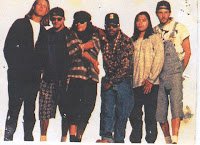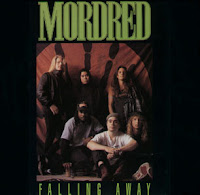1) What have you been up to since Mordred?
Since Mordred I have played in several bands, DEMAG, UNGODLY, CHURCH OF THE GRAND FUNK, HEAT, BLUE SUN, HARLEY SCOTT HOLDERBY, and HIGH SOCIETY, oh yeah,MORDRED in 02.........
Recording I have worked with, SANTANA,THE DONNAS, CEE-LO, JIMMY MCCRACKLIN, DISCO BISCUITS, RICKY WATTERS(of SF 49ers)and many more.
I have recently married my long time girlfriend,Stacy.We have a little shorty and life is good.I could go on and on...............
2) Why did you leave the band ?
Hey man they asked me to go. I think the songs we were working on at the time kinda sucked, and the record co said to fire me. They hated me. The record co always wanted us to sound like our first album, HEAVY.They didn't get why we would have Pause on the tables or why we wanted to funk up the hardcore. I do think it was difficult to replace the bands singer, not cause I'm so fuckin great or anything, just cause people were used to me and my blueness. I don't have any hard feelings toward Paul K. or any of my Mordred bros.I wasn't having any fun anyway.........So it was all good.........
3) Do you think Mordred were ahead of their time ?
I do think it was ahead of it's time. Time has kind of caught up now, lots of new bands hittin on what we were hittin then. I simply had fun with it at the time. We spent alot of loot to do it in style, tour buses, Dutch coffee shops and such. I am happy I was a part of it all
4) What were your best times in the band ?
How long do you want me to go on.....I have had the pleasure of meeting alot of really quality people along the way. Some I still am in contact with. I grew up on the road with Mordred, lived the lifestyle, it was all good, well mostly. The Dynamo fests we played, the Berlin wall, the many flavors of herb, the Italian shows, the Run DMC shows, all of the travel..I really can't complain.
5) What were your favourite Mordred tracks/recordings ?
Vision was my favorite, and Esse Quam, the white album (single) with the Pause re-mix...
Favorite songs, In This Life, The Vagrant,In Time, Unload, Close minded, Strain, Young Lust, W.C.H.....The Vagrant is still my favorite......
6) How well were Mordred received in the United States ?
We did well in parts of U.S.....NYC, DC, all over east coast....Europe was ready for our sound and we really liked playing there . Our label was in Germany so that is why we came over so much. Better support...The last couple of years we only played over seas. (I think,don't quote that).
7) Were there many arguments within the band ?
We had little internal struggles, alliances..I spent alot of my time off the bus, they stayed close to the bus. I went home with people, we cooked, I took showers, I really experienced where we were at the time..There were times when I was the only English speaker (you know when you have a few sometimes it's hard to remember your Eng.) I rode on trains from gig to gig and would show up around sound check. So being that I was gone alot, the Mordreds were happy to see me when I was around. And I wasn't a beer drinker, so they could drink all of mine..There might have been a few explosions over the years. But not many....And we are all cool now.....
8) Why did the band reform for one-off gigs ?
There was a benefit for Chuck Billy (Testament vocalist), when he had cancer,we got together to play that but the bill filled up so fast, we were too late..So we decided to play a show on my birthday, a blowout party..And if you play one show why not three..and why not record something, just for fun..
9) Any chance of a real Mordred reunion ?
I don' know if anything will come of it, but ,we would like to play some dates overseas next summer (2005). If we do I'm pretty sure all original heads will be making it, Danny included. As far as a change in direction, the new songs sound like good old Mordred songs, some heavy, less funky, a little more hip-hop-core. I like them, you have to judge for yourself when you hear it. I don't know about the legal reasons to use or not the name Mordred, we will see what Sanctuary Records has to say.
10) Mordred had such a diverse sound. What were you guys listening to at the time ?
We all listened to such a wide variety of music, all that old hip-hop stuff, old school funk, rare groove, acid, jazz, Hendrix, Bowie, Iggy, English punk rock, Joy Division, Thin Lizzy, Motorhead, skate rock, Jim Carroll, Sly Stone, Agent Orange, Bad Brains. We never listened to metal on the bus (unless it was someones new record)or some 70's Judas Priest. I think we would have explored more stylecrossing if we had stayed together, we only touched upon a few. Personally I liked the direction we were going with Vision. Doing some different songs that all tied together, I guess our other records were like that to a certain extent as well..
11) What gigs did you enjoy most ?
I loved almost every night. I'm sure I looked like I was havin fun. Whatever bullshit was happening between us never came up on stage with us. We all got along pretty well most of the time, there's alot of shit on the road you know....We are all like family even now, and sometimes we bickered like brothers.
I liked the second Dynamo fest, the first one was great also, when I painted myself like Krishna.The Italian shows, all the UK shows (after touring Europe it is nice to be among English speaking peeps) I loved all the DC shows at the 930 club, off the hook....The old Ritz in NYC. The Astoria, The Marquee, London was like my homebase for awhile. I had a girlfriend I lived with on and off, SF to London. I would stay over there between tours.
Oh yeah the Tijuana gigs were off the hook, New Years in TJ.....The Warfield in SF.......I can go on...
12) What stuff are you listening to now ?
I do listen to some hip hop but not the white boy metal stuff. Jurassic 5, Black Eyed Peas, The Roots......Right now I'm listening to Ralphi Pagan/Joe Bataan..............I like Thievery Corp. Naked Music, Ben Watt, you know the old soul stuff. I worked on alot of Stax records when I worked at Fantasy Studios. I like Brazilian music, Cuban, Latin funk, like El Chicano, Malo, Cymande, and much Dub, Soul of Rasta.....
13) I always wondered where you got the 'REAL' t-shirts you used to wear ?
Our homeboy Tommy Guererro, had just left Powell/Peralta, to start his own company, REAL Skateboards. I still have an old T.G. board from back then..
14) Were you surprised that Mordred still create a lot of interest ?
It definitely feels good to know some people out there really like Mordred. The sites are very cool I think, and now that I know they are there, I can send them more stuff. People have written alot of nice things about us..How could that suck....And yes I am surprised there was any interest. We just got together to play awhile back because we thought it would be a good time....And it was. Not knowing who might care...It seems some people still do......It was alot of fun...
15) Any regrets ?
Nope, IT WAS FUN WHILE IT LASTED.............
The questions above were just a select few I chose to publish here although I stayed in touch with Scott for a long time and he sent me some amazing music to hear. I'd love to get back in touch with him, I had a lot of PC problems and lost contact with him. I also had emails from Danny White and a couple from Pause, the various websites that were being dedicated to the band certainly let the guys know there were alot of fans still out there.



 a five K! out of five rating, whilst other magazines such as Metal Forces, Metal Hammer, Raw et al were certainly in praise of the band. Fortunately, I kept most of my Mordred clippings in the hope that some day they would become useful, so here are a good selection for you to look at.
a five K! out of five rating, whilst other magazines such as Metal Forces, Metal Hammer, Raw et al were certainly in praise of the band. Fortunately, I kept most of my Mordred clippings in the hope that some day they would become useful, so here are a good selection for you to look at.






+copy+(80).jpg)
+copy+(64).jpg)

+copy+(65).jpg)














